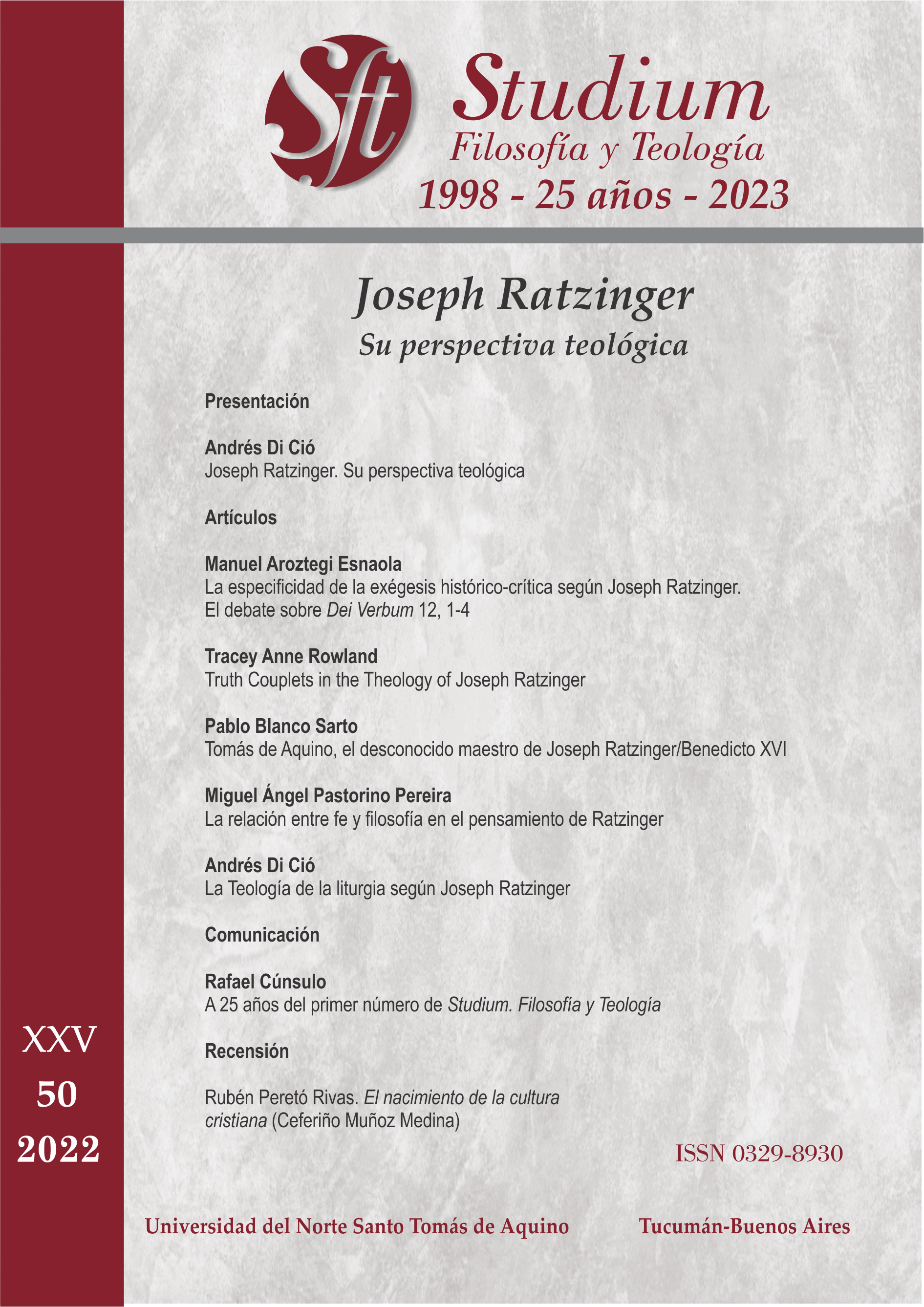The relationship between faith and philosophy in Ratzinger’s thought
DOI:
https://doi.org/10.53439/stdfyt50.25.2022.245-273Keywords:
Ratzinger, Faith, Philosophy, modernity, rationality, theologyAbstract
Following the most philosophical writings of Ratzinger in his criticism of modern philosophy, we briefly present the main lines of thought that, according to the German theologian, gave rise to the current situation regarding the relationship between faith and philosophy, and his concern for the hegemony of technical thought over other forms of knowledge, which relegated faith in the realm of the irrational. In Western societies, positivist and scientific prejudices about faith still prevail, as well as its reduction to a religious feeling. Therefore, to study in depth this subject not only enriches us with the originality of one of the most significant European intellectuals of the 20th century, but also encourages us to rethink, beyond all reductionism, the place of faith and religion in the philosophical reflection and in dialogue with the sciences.
Downloads
References
Acevedo Guerra, J. (1999). Heidegger y la época técnica. Editorial Universitaria.
Agustín (426/1941). La Ciudad de Dios. Poblet.
Arana, J. (Ed). (2013). Falsos saberes. La suplantación del conocimiento en la cultura contemporánea. Biblioteca Nueva.
Benedicto XVI. (2005). Homilía [24 de abril de 2005]. https://www.vatican.va/content/benedict-xvi/es/homilies/2005/documents/hf_ben-xvi_hom_20050424_inizio-pontificato.html
Benedicto XVI. (2009). Caritas in Veritate. https://www.vatican.va/content/benedict-xvi/es/encyclicals/documents/hf_ben-xvi_enc_20090629_caritas-in-veritate.html
Coreth, E. (Ed). (1997). Filosofía cristiana en el pensamiento católico de los siglos XIX y XX (Vol. III). Encuentro.
Fazio, M. (2011). Cooperadores de la verdad. El antídoto de Benedicto XVI contra la dictadura del relativismo. Logos.
Fernández-Rañada, A. (2008). Los científicos y Dios. Trotta
Gilson, E. (1981). El Espíritu de la filosofía medieval. Rialp.
Heidegger, M. (1987). Introducción a la metafísica. Gedisa.
Kant, I. (1781/1997). Crítica de la razón pura. Santillana.
Le Goff, J. (2008). Los intelectuales en la Edad Media. Gedisa.
Marx, K. (1845/1973). Tesis sobre Feuerbach. En K. Marx y F. Engels, Obras escogidas (Vol. 1, p. 7-10). Progreso.
Merlo, V. (2009). La llamada de la Nueva Era. Kairós.
Ratzinger, J. (1962). La fe en Dios y el Dios de los filósofos. Taurus.
Ratzinger, J. (1973). Fe y futuro. Sígueme.
Ratzinger, J. (1984/2008). Naturaleza y misión de la Teología. San Pablo.
Ratzinger, J. (1985). Teoría de los principios teológicos. Materiales para una teología fundamental. Herder.
Ratzinger, J. (1990). Mirar a Cristo. Ejercicios de fe, esperanza y amor. EDICEP.
Ratzinger, J. (1992). Creación y pecado. EUNSA.
Ratzinger, J. (1997). Mi vida. Autobiografía. Encuentro.
Ratzinger, J. (2005). Fe, verdad, tolerancia. Sígueme.
Ratzinger, J. (2006). El cristianismo en la crisis de Europa. Cristiandad.
Ratzinger, J. (2007). Una mirada a Europa: Iglesia y modernidad en la Europa de las revoluciones. Rialp.
Ratzinger, J. (2011). Fe y ciencia. Un diálogo necesario. Sal Terrae.
Ratzinger, J. (2013). Introducción al cristianismo. Sígueme.
Suárez, L. (1976). Grandes interpretaciones de la historia. EUNSA.
Udías, A. (2010). Ciencia y religión: Dos visiones del mundo. Sal Terrae.

















